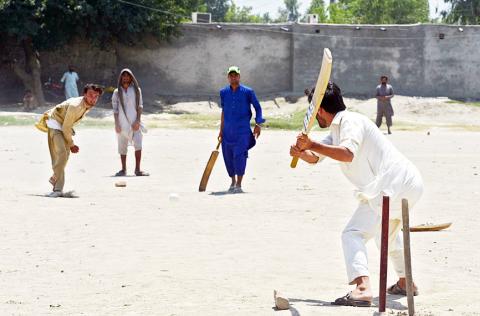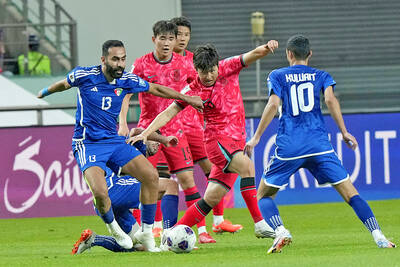The manicured, emerald pitch at Lord’s in London, where Afghanistan on Tuesday played for the first time ever, is a world away from the border refugee camps where the nation found its love for cricket.
In dusty Pakistani camps like Khurasan, young barefoot cricketers have no pitch, no kit, no wickets, no helmets, no gloves and no shade — only the hunger that helped catapult Afghanistan into the elite group of Test nations last month.
Millions of Afghans fleeing war have sought refuge for nearly 40 years in camps outside Pakistan’s border city of Peshawar, where they have been exposed to the cricketing fever that has gripped Pakistan since Britain colonized the sub-continent centuries ago.

Photo: AFP
“We learned cricket here and we took this cricket with us to Afghanistan, and now Afghanistan has a team which plays on a world level and the entire world has recognized it,” 35-year-old Abdul Wahid, a refugee from Kunar province, told reporters.
He and a generation of Afghans spent years cheering for the Pakistan team before daring to dream of more.
Wahid, who missed out on a spot in the national team, but now coaches refugees, said his contemporaries in the camps learned to play with tennis balls.
The best of them would go on to join academies in Peshawar, where they encountered the hard cricket ball for the first time.
Faridullah Shah, a coach with the Pakistan Cricket Board, remembers the fierce determination of the Afghan players who reached the academies.
“They used to work as laborers until the afternoon and were later playing cricket here... The team of Afghan players was named the ‘Team of Chickens’” as many were trying to survive by supplying poultry in Peshawar, he said.
They worried about how to afford kit, but played every day, Shah said. “They had extreme eagerness — more than our players — and that was the reason for their success.”
At the Islamia Cricket Academy, selector Qazi Shafiq, a former first-class player, agreed.
“Afghans are quick learners: If you pinpoint a mistake, he understands ... then he will work hard on that,” Shafiq said. “I will not mention his name, but one Afghan national player told me that he had to borrow money to reach here ... and then he could only afford a 10-rupee (US$0.1) packet of biscuits a day on which to survive.”
Asghar Khan, a coach and twice the president of the Peshawar District Cricket Association, said Afghan players are “the beauty of tournaments here.”
He rattled off a list of names, from Mohammad Nabi — whom Khan praised for his “long, long sixes” — to Asghar Stanikzai, captain of the Afghanistan cricket team.
All learned in Peshawar, Khan said, with many like Shapoor Zadran beginning in the refugee camps.
A picture of Afghanistan cricket star Muhammad Shahzad from his days as a club player in Peshawar is still on display in Gymkhana, the biggest of the city’s cricket academies — testament to his entertaining playing style even as he faces an International Cricket Council suspension for failing a drug test.
Today, the number of Afghan cricketers training in the Peshawar academies is dwindling, officials say.
Pakistan last year launched a controversial bid to drive refugees back into Afghanistan, which has seen hundreds of thousands of people flow back over the porous border, while new restrictions imposed by both Islamabad and Kabul are also affecting the players.
Whether the changes will stall the nation’s meteoric rise remains to be seen.
Cricket in Afghanistan struggled under the Taliban, which views sports as a distraction from religious duties.
However, now even members of the Taliban — whose regime was toppled 16 years ago, but is now surging again, dealing stinging blows to Afghan forces — have caught the cricketing bug, one insurgent commander told reporters.
“Now, not only do they listen to cricket on radio, but they even play it when they have spare time,” the commander said.
The ecstasy with which Afghans greeted the news they had been granted Test status, and the enthusiasm with which fans watched the Lord’s match — even though it was rained out, leaving the players without a result — suggests a brighter future for cricket players, even as insecurity spirals once more.
Arshad Khan, a 17-year-old left-arm spin bowler from Nangarhar Province who now trains at the Islamia academy, said he has made a commitment to himself that one day he will play for Afghanistan.
“I am hopeful that I will be selected,” the young refugee said.

Brazil has four teams, more than any other country, in the expanded Club World Cup that kicked off yesterday in the US, but for SE Palmeiras, the competition holds a special meaning: winning it would provide some redemption. Under coach Abel Ferreira since 2020, Palmeiras lifted two Copa Libertadores titles, plus Brazilian league, cup and state championships. Even before Ferreira, it boasted another South American crown and 11 league titles. The only major trophy missing is a world champions’ title. Other Brazilian clubs like Fluminense FC and Botafogo FR, also in the tournament, have never won it either, but the problem for Palmeiras

Paris Saint-Germain’s Lee Kang-in has pleaded with South Korea fans to get behind the team at the 2026 FIFA World Cup after more boos were aimed at coach Hong Myung-bo despite leading them to qualification. South Korea reached next year’s finals in North America without losing a game, but that does not tell the whole story. The country’s soccer association has been in the firing line, having scrambled about to find a successor after sacking the unpopular Jurgen Klinsmann in February last year. They eventually settled on Hong, the decorated former skipper who had an unsuccessful stint as coach in 2013-2014, during which

Lionel Messi drew vast crowds and showed flashes of his brilliance when his Inter Miami side were held to a goalless draw by African giants Al-Ahly as the revamped FIFA Club World Cup got off to a festive start on Saturday. Fans showed up en masse for the Group A clash at the Hard Rock Stadium, home to the NFL’s Miami Dolphins, but Messi could not fully deliver, his best chance coming through a last-second attempt that was deflected onto the crossbar. Inter Miami next face FC Porto on Thursday in Atlanta, while Al-Ahly, who benefited from raucous, massive support, are to

Ferrari’s F1 fortunes might be flagging, but the Italian team start this weekend’s 24 Hours of Le Mans as favorites, targeting a third consecutive triumph in motorsport’s fabled endurance classic. Roger Federer is acting as celebrity starter with the tennis icon getting the 93rd edition of the jewel in four-wheeled endurance racing’s crown under way tomorrow. Twenty-four hours later, through daylight, darkness and dawn, the 21 elite hypercars are to battle it out over 300 laps (more than 4,000km) in front of a sold-out 320,000 crowd burning the midnight oil with copious quantities of coffee and beer. Ferrari made a triumphant return after